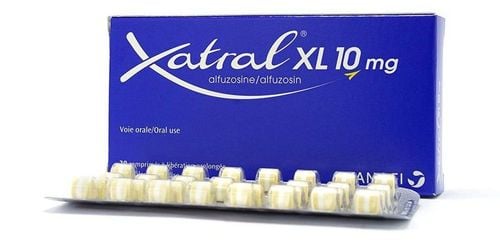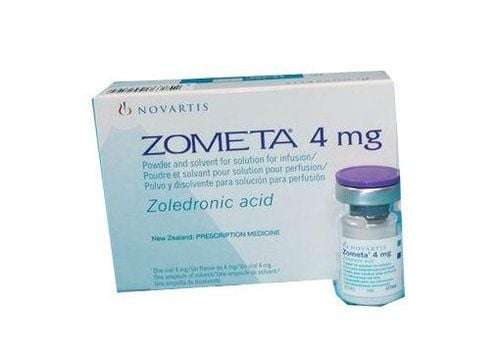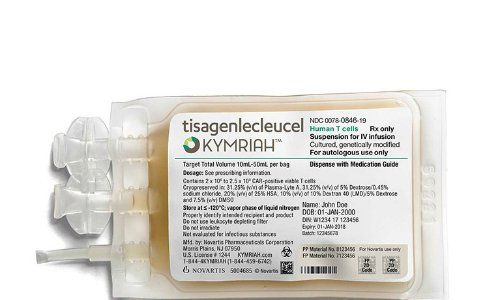This is an automatically translated article.
Prostate cancer is a common cancer in men. Zytiga is an anti-androgen drug that treats this type of cancer with the active ingredient Abiraterone. So what is Zytiga and how should it be used?
1. Introduction of Zytiga
Most prostate tumors require the male hormone testosterone to grow. This is an androgen produced by the testes and adrenal glands. Abiraterone Acetate is an anti-androgen therapy by inhibiting the enzyme required for testosterone production. Without testosterone, prostate cancer cells may slow down or stop altogether.
2. How to use the cancer drug Zytiga (Abiraterone Acetate)
Zytiga (Abiraterone acetate) produced in tablet form, patients may have to take several Zytiga tablets at the same time as prescribed by the doctor, once a day on an empty stomach. Patients should not eat 2 hours before and 1 hour after taking Zytiga cancer medicine. A note about the use of this preparation is to swallow the tablet whole with water, do not chew, bite or crush. If having difficulty swallowing Zytiga tablets, patients should contact their pharmacist or doctor for instructions.
In case of forgetting to take a dose of Zytiga, the patient should skip it and take the next dose at the prescribed time, absolutely do not take the supplement to make up for the missed dose. If more than one dose of Zytiga has been missed, the patient should contact their doctor for advice.
The important issue is that the patient must ensure that Zytiga is taken at the recommended dose. Before each dose, check to see if the dose you are about to take is appropriate. Zytiga is often used in combination with prednisone (a form of corticosteroid), so be sure to use it exactly as prescribed.
Blood levels of Abiraterone Acetate may be affected when Zytiga is taken at the same time with certain foods or medications, including Rifampin, Phenytoin, Carbamazepine, Rifabutin, Rifapentine and Phenobarbital...
Patients need to store the drug. Zytiga in the manufacturer's packaging, labeled on the outside, and stored in a dry place at room temperature.
If the patient is unable to take the medication on their own and must rely on someone else, note that they should consider wearing gloves or pouring Zytiga directly into the patient's hand. At the same time, caregivers must always wash their hands before and after giving medication to a patient.
3. Side effects of Zytiga (Abiraterone Acetate)
Patients can take a number of measures as recommended by their doctor to control the side effects of Zytiga. The following are some common or important side effects of this preparation.
3.1. Fatigue Fatigue is a symptom experienced by most cancer patients and most do not improve with rest. During use and for a period of time after stopping Zytiga, patients may need to change their daily routine to control fatigue, prioritizing rest and saving energy for exercise. perform more important activities.
3.2. Muscle pain, joint pain, headache This is a side effect of Zytiga. The oncologist may recommend certain medications and other measures to control pain.
3.3. Peripheral edema The manifestation of this side effect is swelling of the limbs due to increased fluid retention, which may occur in the hands, arms, anterior tibia, ankles and feet. Sometimes the swelling of the extremities is very uncomfortable for the patient, so contact your doctor if you experience any signs of swelling in the limbs.
3.4. Hot flashes Patients can take a number of measures to control hot flashes during treatment with Zytiga . Several medications have been shown to help relieve symptoms, including Clonidine, low doses of some antidepressants (such as Venlafaxine and Fluoxetine), and Gabapentin. Patients should talk to their doctor about these indications to determine if they are right for them.
Some other recommendations to help control hot flashes caused by Zytiga:
Add enough water every day; Drink ice or apply ice at the onset of a hot flash; Wear cotton or lightweight, breathable clothing; Exercise regularly; Meditating or doing relaxation exercises helps manage stress as these can trigger hot flashes; Avoid triggers such as saunas, spicy foods, caffeinated beverages, and alcohol. 3.5. Changes in blood sugar Zytiga may affect a patient's blood sugar level, which may be low or elevated regardless of whether the patient has diabetes. The treating physician needs to monitor the patient's blood sugar periodically. Symptoms of hypoglycemia include tremors, heart palpitations, dizziness, hunger, sweating, and confusion. Signs of hyperglycemia include increased thirst, increased urination, hunger, blurred vision, headache, or fruity breath. If any of the above symptoms are present, the patient should notify the doctor immediately.
3.6. Changes in mental status Some male patients have reported mood swings and depression during treatment with Zytiga . Sharing your feelings with a loved one or close friend can be helpful for someone with this condition. If sadness is getting in the way of life, talk to your doctor about finding a psychologist who has experience working with cancer patients.
3.7. Osteoporosis Men who take hormone therapy, such as Zytiga, for a long time have an increased risk of osteoporosis. Patients may be advised to increase their calcium and vitamin D supplements to reduce the risk of this side effect. It is best to get calcium through a balanced diet, including calcium-rich foods every day such as low-fat milk, yogurt, cheese, dark green leafy vegetables, nuts, and seeds. , kinds of bean.
Vitamin D is not found in many foods, so it will be difficult to get it through diet. Our bodies can make vitamin D when our skin is exposed to the sun. However, many people have a habit of avoiding the sun and applying sunscreen, which makes them not get enough Vitamin D needed for bone growth. Your doctor can prescribe calcium and vitamin D supplements with drugs in the right dosage.
Patients taking Zytiga who have symptoms suggestive of osteoporosis can have a bone density scan (DEXA scan) for diagnosis. If you are at high risk for osteoporosis, your doctor will recommend treatment with a group of drugs called Bisphosphonates to help strengthen bones.
3.8. Uncommon but potentially important side effects Electrolyte disturbances: The cancer drug Zytiga can affect the normal levels of electrolytes in the patient's body. The extent of the disorder is identified and monitored with blood tests. If the electrolyte level is too low, the patient will be prescribed appropriate supplements by the doctor by intravenous or oral route; Hypertension: Zytiga can cause high blood pressure and swelling. Patients should have their blood pressure checked regularly during treatment with Zytiga and if hypertension is present, appropriate treatment should be given. If target blood pressure is not achieved, the patient may have to discontinue Zytiga. If there are symptoms such as headache, dizziness, heart palpitations, rapid weight gain or swelling in the legs or feet, the patient should inform the doctor; Hepatotoxicity: Zytiga can cause liver damage, so doctors must monitor it regularly with liver function tests; Adrenal insufficiency: Zytiga is often combined with prednisone. Patients should not stop taking Prednisone without consulting their doctor. In some cases, it may be necessary to increase the dose of steroids, but patients should not take higher doses than prescribed by their doctor.
4. Zytiga . Sexual and Reproductive Effects
Zytiga may affect a patient's reproductive system, resulting in a permanent reduction or cessation of sperm production. In addition, patients may experience erectile dysfunction or decreased sex drive while using Zytiga. So talk to your urologist about erectile dysfunction treatment options.
Exposure of newborns to Zytiga can cause birth defects, so patients should not father while taking Zytiga. Practicing effective forms of birth control is essential during use and for at least 3 weeks after the last dose, even if the patient believes no longer sperm production.
If having sex with a woman of childbearing age, the patient taking Zytiga should use a condom in combination with another form of birth control. Patients may want to consider a sperm bank if they still want to have children in the future.
Please dial HOTLINE for more information or register for an appointment HERE. Download MyVinmec app to make appointments faster and to manage your bookings easily.
Reference source: oncolink.org













